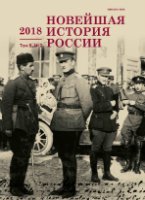Судебная вертикаль власти в политико-правовой системе Белого движения: особенности организации гражданской и военной юстиции в 1918–1920 гг.
The Judicial “Vertical of Power” in the Political and Legal System of the White Movement, 1918–1920, Civil and Military Justice
Author(s): V. Zh. TsvetkovSubject(s): Law, Constitution, Jurisprudence, Military history, Political history, Pre-WW I & WW I (1900 -1919), Interwar Period (1920 - 1939)
Published by: Издательство Исторического факультета СПбГУ
Keywords: Civil war; Russia; Judicial System; South; Siberia; White movement; A.I.Denikin; A.V.Kolchak; P.N.Wrangel;
Summary/Abstract: The article considers the formation of judicial system of the white governments of the Southern Russia and Siberia in 1918–1920. The restoration of the judiciary, the determination of its status in the changed conditions of the Russian Revolution and the Civil War became the most important direction of the policy of the Russian White movement. White governments proclaimed the restoration of the principles of the judicial reform of 1864. The article analyzes the issues related to the activities of the judiciary at various levels: from Government Senate to the local judiciary. The author describes the problems of the functioning of judicial system in the conditions of military operations as well as regional legal specificity. The restoration and formation of the judicial system was an important element of the functioning of the white power. However, in the conditions of war and with an acute shortage of qualified personnel, the legal system was restored as quickly as possible and in the most simplified forms. One of the significant problems of the functioning of the judicial system in both the White South and Siberia was the lack of clear delineation of the competence of military and civil justice, as well as the unacceptable adherence to the norms of the “emergency situation” in peacetime. This was repeatedly pointed out in the Senate conclusions published in Novocherkassk and Omsk, this was mentioned in speeches, memoranda, published in the white press. However, it was very difficult to overcome such conflicts, and throughout the years of the “Russian Troubles”, military structures dictated their decisions, often with violations of the rule of law and arbitrary interpretation of certain legal situations.
Journal: Новейшая история России
- Issue Year: 8/2018
- Issue No: 23
- Page Range: 294-307
- Page Count: 14
- Language: Russian

